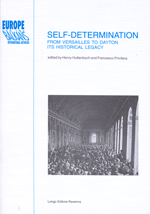and Balkan Europe
by IECOB & AIS Università di Bologna

Self-Determination
From Versailles To Dayton Its Historical Legacy
edited by: Henry Huttenbach and Francesco Privitera
published by: A. Longo editore
pp: 200
ISBN: 88-8063-227-2
price: € 15.49

Self-determination has deeply influenced international relations and the process of state building, particularly in Europe during the current century. Since the time of Wilson and Lenin, this political doctrine was used and/or abused by policy makers, leaders and political parties to re-define the geopolitical map of Europe as well as to establish a better security for their people.
In the last years, the Dayton agreement and the Kosovo problem (and previously the way how the former Yugoslav republics were recognised by the European Union) have strengthened the relevant role of self determination and secession, even offering new patterns for what we can call a "new political morality for the 21st Century".
The aim of this work is to analyse the concept and the policies of self determination in the Russian, German and Balkan areas during the twentieth century not only in a historical perspective but also taking into account the possible consequences on internal and international relations in the near future.
There are no collective discussions or considerations of the topic both historical and comparative. Moreover, the relations between dictatorships and self-determination, as well as amongst dictatorships-democracies and self-determination, have been rarely explored.
There have been several studies on self-determination under communism but these were written when communism was still in power. This both is the effort of those who wrote this collection of essays intending to contribute to the debate on self-determination as the starting point for a new approach on the topic, in order to find for the next century an alternative political morality to the historical legacy of the twentieth century and the tragedies of the peoples of Eastern Europe.
Table of Contents
Foreword by Henry Huttenbach and Francesco Privitera
PART ONE - Self-Determination and Ethno-Nationalism: Wilson versus Lenin
Allen C. Lynch, Woodrow Wilson and the Principle of «National Self-Determination», as Applied to Habsburg Europe
Iurii M. Garushiants, The National Programme of Leninism
PART TWO - Hitler, Racist Nationalism and the New European Order
Gustavo Corni, "Volk", "Nation", "Rasse" in the Theory and Practice of the National Socialism
Wolfgang Wippermann, German Policy and the Rejected Peoples
Frank Golczewski, The Nazi "New European Order" and the Reactions of Ukrainians
PART THREE - Yugoslav Communism and the National Agreement
Francesco Privitera, The Yugoslav Communists between National Question and Self-Determination before Second World War
Leonid Gibianskii, Tito and Regional Balkan Agreements (Attempts at Integration of the Balkans)
PART FOUR - The Rise of Ethnic-State and the Dilemmas for Future Political Morality
Damir Grubisa, Self-Determination in the Post-communist Era
Henry Huttenbach, The Decline of European Politics: Then and Now
Stefano Bianchini, The Changing Notion of Self-Determination. Global Repercussions for the International Community
Rudolf M.Rizman, Self-Determination and Secession in a Sociological Perspective: Solution or a Problem?
List of Contributors
Download
PECOB: Portal on Central Eastern and Balkan Europe - University of Bologna - 1, S. Giovanni Bosco - Faenza - Italy
Chiudi la versione stampabile della pagina e ritorna al sito.